Related Research Articles

Margaret Hilda Thatcher, Baroness Thatcher, was a British stateswoman and Conservative politician who served as Prime Minister of the United Kingdom from 1979 to 1990 and Leader of the Conservative Party from 1975 to 1990. She was the longest-serving British prime minister of the 20th century and the first woman to hold the position. As prime minister, she implemented economic policies known as Thatcherism. A Soviet journalist dubbed her the "Iron Lady", a nickname that became associated with her uncompromising politics and leadership style.
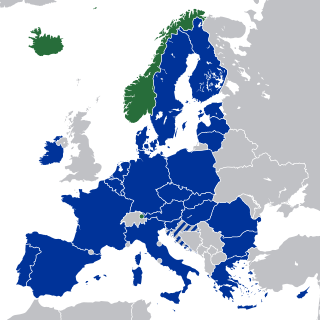
The European Economic Area (EEA) was established via the Agreement on the European Economic Area, an international agreement which enables the extension of the European Union's single market to member states of the European Free Trade Association (EFTA). The EEA links the EU member states and three of the four EFTA states into an internal market governed by the same basic rules. These rules aim to enable free movement of persons, goods, services, and capital within the European single market, including the freedom to choose residence in any country within this area. The EEA was established on 1 January 1994 upon entry into force of the EEA Agreement. The contracting parties are the EU, its member states, and Iceland, Liechtenstein, and Norway. New members of EFTA would not automatically become party to the EEA Agreement, as each EFTA State decides on its own whether it applies to be party to the EEA Agreement or not. According to Article 128 of the EEA Agreement, "any European State becoming a member of the Community shall, and the Swiss Confederation or any European State becoming a member of EFTA may, apply to become a party to this Agreement. It shall address its application to the EEA Council." EFTA does not envisage political integration. It does not issue legislation, nor does it establish a customs union. Schengen is not a part of the EEA Agreement. However, all of the four EFTA States participate in Schengen and Dublin through bilateral agreements. They all apply the provisions of the relevant Acquis.
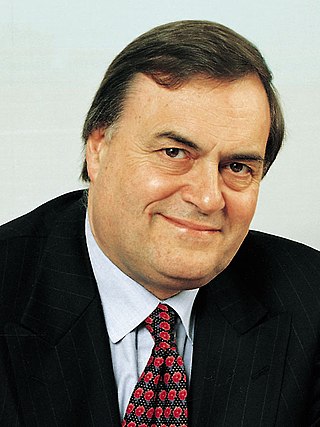
John Leslie Prescott, Baron Prescott was a British politician who served as Deputy Prime Minister of the United Kingdom from 1997 to 2007 and as First Secretary of State from 2001 to 2007. A member of the Labour Party, he was Member of Parliament (MP) for Kingston upon Hull East for 40 years, from 1970 to 2010. He was often seen as the political link to the working class in a Labour Party increasingly led by modernising, middle-class professionals such as Tony Blair and Peter Mandelson, and developed a reputation as a key conciliator in the often fractious relationship between Blair and Gordon Brown.
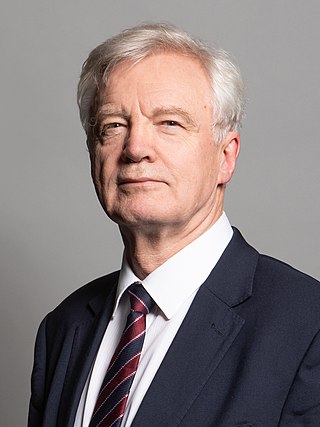
Sir David Michael Davis is a British Conservative Party politician serving as the Member of Parliament (MP) for Goole and Pocklington. He was previously the MP for Haltemprice and Howden and, before that, for Boothferry, where he was first elected in 1987. He served as Shadow Home Secretary from 2003 to 2008 and Secretary of State for Exiting the European Union from 2016 to 2018. Davis was sworn of the Privy Council in the 1997 New Year Honours, having previously been Minister of State for Europe from 1994 to 1997.

Sir Malcolm Leslie Rifkind is a British politician who served in the cabinets of Margaret Thatcher and John Major from 1986 to 1997, and most recently as chair of the Intelligence and Security Committee of Parliament from 2010 to 2015. He is also known for his advocacy of a pro-European stance within his party's policies.

The Croatian Democratic Union is a major conservative, centre-right political party in Croatia. Since 2016, it has been the ruling political party in Croatia under the incumbent Prime Minister Andrej Plenković. It is one of the two major contemporary political parties in Croatia, along with the centre-left Social Democratic Party (SDP). It is currently the largest party in the Sabor with 55 seats. The HDZ governed Croatia from 1990 before the country gained independence from Yugoslavia until 2000 and, in coalition with junior partners, from 2003 to 2011, and since 2016. HDZ is a member of the Centrist Democrat International, International Democracy Union, and the European People's Party, and sits in the European People's Party Group in the European Parliament. HDZ is the first political party in Croatia to be convicted of corruption.
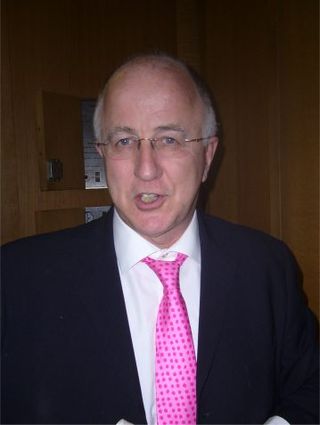
Denis MacShane is a British former politician, author, commentator and convicted criminal who served as Minister of State for Europe from 2002 to 2005. He joined the Labour Party in 1970 and has held most party offices. He was Member of Parliament (MP) for Rotherham from 1994 to his forced resignation in 2012.
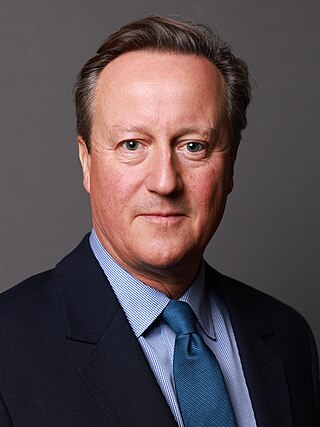
David William Donald Cameron, Baron Cameron of Chipping Norton, is a British politician who served as Prime Minister of the United Kingdom from 2010 to 2016. After his premiership, he served as Foreign Secretary in Rishi Sunak’s government from 2023 to 2024. Cameron was Leader of the Conservative Party from 2005 to 2016. He was Leader of the Opposition from 2005 to 2010 and Member of Parliament (MP) for Witney from 2001 to 2016. Cameron identifies as a one-nation conservative and has been associated with both economically liberal and socially liberal policies.

The Charter of Fundamental Rights of the European Union (CFR) enshrines certain political, social, and economic rights for European Union (EU) citizens and residents into EU law. It was drafted by the European Convention and solemnly proclaimed on 7 December 2000 by the European Parliament, the Council of Ministers and the European Commission. However, its then legal status was uncertain and it did not have full legal effect until the entry into force of the Treaty of Lisbon on 1 December 2009.
The Anti-Fascist Council for the National Liberation of Yugoslavia, commonly abbreviated as the AVNOJ, was a deliberative and legislative body that was established in Bihać, Yugoslavia, in November 1942. It was established by Josip Broz Tito, the leader of the Yugoslav Partisans, an armed resistance movement led by the Communist Party of Yugoslavia to resist the Axis occupation of the country during World War II.

Viktor Mihály Orbán is a Hungarian lawyer and politician who has been Prime Minister of Hungary since 2010, previously holding the office from 1998 to 2002. He has also led the Fidesz political party since 2003, and previously from 1993 to 2000. He was re-elected as prime minister in 2014, 2018, and 2022. On 29 November 2020, he became the country's longest-serving prime minister.

The most recent enlargement of the European Union saw Croatia become the European Union's 28th member state on 1 July 2013. The country applied for EU membership in 2003, and the European Commission recommended making it an official candidate in early 2004. Candidate country status was granted to Croatia by the European Council in mid-2004. The entry negotiations, while originally set for March 2005, began in October that year together with the screening process.
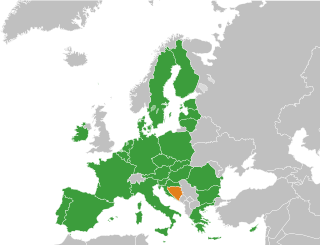
The accession of Bosnia and Herzegovina to the European Union (EU) is the stated aim of the present relations between the two entities. Bosnia and Herzegovina has been recognised by the European Union as a "candidate country" for accession since the decision of the European Council in 2022 and is on the current agenda for future enlargement of the EU. Bosnia and Herzegovina takes part in the Stabilisation and Association Process and trade relations are regulated by an Interim Agreement.

David Wright Miliband is the president and chief executive officer (CEO) of the International Rescue Committee and a former British Labour Party politician. He was the Foreign Secretary from 2007 to 2010 and the Member of Parliament (MP) for South Shields in North East England from 2001 to 2013. He and his brother, Ed, were the first siblings to sit in the Cabinet simultaneously since Edward, Lord Stanley and Oliver Stanley in 1938. He was a candidate for Labour Party leadership in 2010, following the departure of Gordon Brown, but was defeated by his brother and subsequently left politics.

The accession of Croatia to NATO took place in 2009. The country entered into Partnership for Peace in 2000, which began the process of accession into the alliance. It received an invitation to join at the 2008 Bucharest summit and became a full member on April 1, 2009.
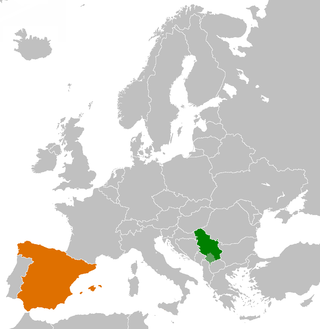
Serbia-Spain relations are foreign relations between Serbia and Spain. Both countries established diplomatic relations on October 14, 1916. Serbia has an embassy in Madrid. Spain has an embassy in Belgrade. Both countries are member states of the UN, Interpol, COE and OSCE. Spain is member state of the EU since 1986 and Serbia is a candidate country since 2012 negotiating its future membership which Spain is strongly supporting. In relation to third parties, both countries supported position of Argentina in its Falkland Islands sovereignty dispute with the United Kingdom in the past.

The Treaty of Accession 2011 is an agreement between the member states of the European Union and Croatia concerning Croatia's accession to the EU. It was signed on 9 December 2011 in Brussels by the heads of state or government of the 27 member states and by the president of Croatia, Ivo Josipović, and Prime Minister Jadranka Kosor. The Treaty entered into force on 1 July 2013, making Croatia the 28th country to join the European Union.
The independence of Croatia was a process started with the changes in the political system and the constitutional changes in 1990 that transformed the Socialist Republic of Croatia into the Republic of Croatia, which in turn proclaimed the Christmas Constitution, and held the 1991 Croatian independence referendum.

Maria Elisabet Wallgren Arnholm is a Swedish politician who has served as Governor of Kronoberg County since 1 February 2020.

Andrej Plenković is a Croatian politician serving as the prime minister of Croatia since October 2016. He was previously one of eleven Croatian members of the European Parliament, serving from Croatia's accession to the European Union in 2013 until his resignation as MEP when he took office as prime minister. Plenković has also been serving as the president of the Croatian Democratic Union since 2016.
References
- ↑ Maria Arnholm appointed Minister for Gender Equality Archived 2013-01-30 at the Wayback Machine
- ↑ (BBC) (AP) (The Guardian)
- ↑ "Croatia joins EU amid celebrations and uncertainty about future". The Guardian. London. July 1, 2013. ISSN 0261-3077 . Retrieved July 1, 2013.
- ↑ "19th Session of the Conference of the Parties to the UNFCCC". International Institute for Sustainable Development . Retrieved 20 February 2013.